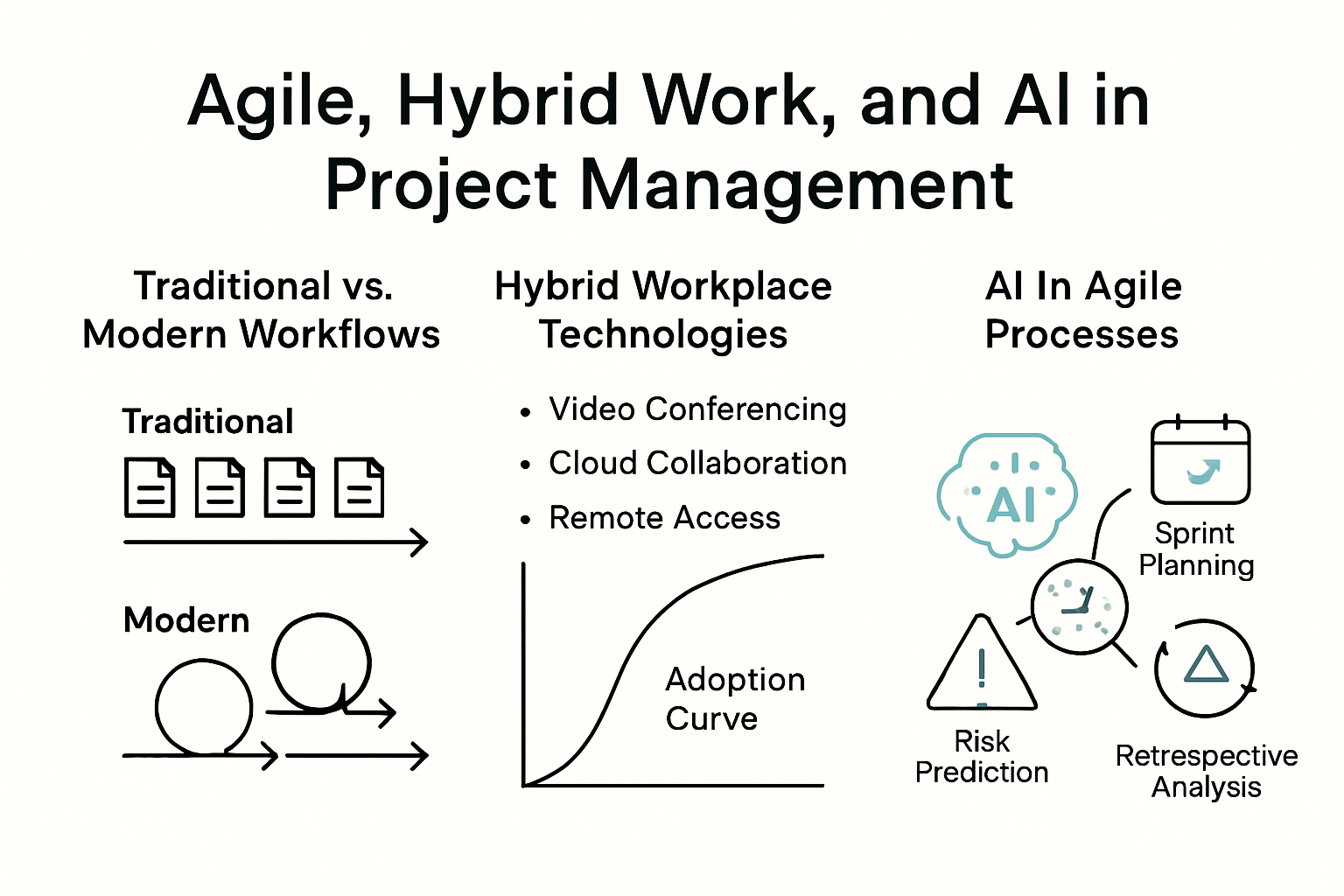Project management in 2025 looks nothing like the old days of endless spreadsheets and daily check-ins. Teams now work across time zones, and the rules just changed again. Artificial intelligence is already providing project managers with predictive analytics that pinpoint risks and optimize resources faster than any human ever could. Most people assume tech will make the biggest difference, but the true success stories are coming from leaders who double down on human skills. What happens when both your tools and your team evolve at the same time? The answer may surprise you.
Table of Contents
- Emerging Technologies Shaping Project Management
- Agile And Hybrid Methods For Modern Teams
- Prioritizing People And Soft Skills In 2025
- Adapting To Remote And Global Collaboration
Quick Summary
| Takeaway | Explanation |
|---|---|
| AI enhances project decision-making | AI offers predictive analytics that help identify risks and optimize resources efficiently, transforming project management into a data-driven process. |
| Emotional intelligence is essential for leaders | Managers must develop emotional intelligence to foster creativity, build trust, and navigate team dynamics in complex work environments. |
| Hybrid strategies improve collaboration | Adapting hybrid work methods allows teams to choose effective collaboration formats, accessing the best of both remote and in-person interactions. |
| Clear communication protocols are crucial | Establishing explicit communication guidelines enhances coordination and minimizes misunderstandings among global teams working remotely. |
| Focus on outcomes in performance management | Transitioning from time-based metrics to outcome-focused assessments fosters team productivity and supports innovative collaboration in remote settings. |
Emerging Technologies Shaping Project Management
Project management is undergoing a profound technological transformation in 2025, with emerging technologies redefining how teams collaborate, plan, and execute projects. The convergence of artificial intelligence, blockchain, and advanced collaboration tools is creating unprecedented opportunities for efficiency and innovation.
AI and Machine Learning in Project Intelligence
Artificial intelligence is revolutionizing project management by providing predictive analytics and intelligent decision-making capabilities. According to ILX Group, AI algorithms can now forecast potential project risks, optimize resource allocation, and provide real-time insights into team performance. Machine learning models analyze historical project data to predict potential bottlenecks, suggest optimal workflow strategies, and automate routine administrative tasks.
These intelligent systems go beyond traditional project tracking by offering nuanced recommendations. They can predict project timelines with remarkable accuracy, identify skill gaps within teams, and even suggest personalized training interventions. Project managers now have access to sophisticated tools that transform raw data into actionable strategic intelligence.
Blockchain for Enhanced Project Transparency
Blockchain technology is emerging as a game-changer in project management transparency and accountability. As Transparity highlights, blockchain creates immutable, decentralized records of project transactions, contracts, and milestones. This technology ensures that every project interaction is securely documented and verifiable, reducing disputes and increasing trust among stakeholders.
In complex multi-stakeholder projects, blockchain enables smart contracts that automatically execute when predefined conditions are met. These self-executing agreements streamline payment processes, track deliverables, and provide crystal-clear audit trails. Project managers can now have unprecedented visibility into project progress, resource utilization, and contractual compliance.
Advanced Collaboration Technologies
The rise of hybrid work environments has accelerated the development of sophisticated collaboration technologies. Virtual and augmented reality tools are creating immersive project management experiences, allowing distributed teams to collaborate as if they were in the same physical space. Advanced communication platforms integrate real-time translation, contextual messaging, and seamless file sharing, breaking down geographical and linguistic barriers.
These technologies are not just about communication but about creating shared digital workspaces that foster creativity and collective intelligence. Integrated platforms now combine project management, communication, and knowledge management into unified ecosystems that adapt to team dynamics and individual work styles.
As we move through 2025, these emerging technologies are not just tools but strategic enablers that transform project management from a administrative function to a dynamic, intelligent process. Learn more about our advanced project tracking strategies to stay ahead in this technological revolution.
Agile and Hybrid Methods for Modern Teams
In 2025, project management methodologies are experiencing a profound transformation, with agile and hybrid approaches becoming the cornerstone of team productivity and organizational flexibility. Traditional rigid frameworks are giving way to more adaptive, responsive strategies that prioritize collaboration, continuous improvement, and technological integration.
Evolution of Agile Methodologies
Agile methodologies continue to expand beyond software development, becoming a universal approach across diverse industries. According to research from the AI-powered project management study, artificial intelligence is now fundamentally reshaping how agile teams operate. AI technologies are automating repetitive tasks, providing predictive analytics for project estimation, and generating actionable recommendations that enhance team performance.
The integration of AI into agile practices allows teams to move beyond reactive project management toward proactive strategic planning. Machine learning algorithms can now analyze historical project data, identify potential bottlenecks before they emerge, and suggest optimal workflow adjustments. This intelligent approach transforms agile from a methodology into a dynamic, adaptive ecosystem that continuously learns and improves.
Hybrid Work and Collaborative Strategies
Hybrid work environments are driving significant changes in project management methodologies. Research on hybrid work in agile settings reveals that successful teams are reimagining how and when collaboration occurs. Organizations are developing nuanced strategies that differentiate between types of meetings and interactions, recognizing that not all collaborative activities are equally effective in remote or in-person settings.
For instance, brainstorming and complex problem-solving sessions benefit from in-person interactions, while large-scale information sharing can be effectively conducted through digital platforms. This approach requires sophisticated communication tools and a cultural shift toward more flexible, trust-based team dynamics. Project managers are becoming facilitators of these adaptive work environments, focusing on outcomes rather than traditional time-based metrics.
Data Management in Agile Environments
Data management has emerged as a critical challenge in modern agile project management. Recent studies on data integration in agile development highlight the complexity of managing information across distributed teams and technological platforms. Advanced automation tools and decentralized data management practices are becoming essential for maintaining project coherence and enabling real-time decision-making.
Teams are implementing sophisticated data governance frameworks that allow for rapid information sharing while maintaining security and compliance. This approach requires not just technological solutions but also a cultural commitment to transparency, continuous learning, and collaborative knowledge management.
As project management continues to evolve, the lines between methodologies are blurring. Hybrid approaches that combine the best elements of agile, traditional project management, and emerging technologies are becoming the new standard. Explore our comprehensive guide to collaborative decision-making to understand how modern teams are navigating these complex transformations.

Prioritizing People and Soft Skills in 2025
As technology continues to reshape project management, 2025 marks a critical turning point where human skills become more important than ever. The complex technological landscape demands not just technical proficiency but a nuanced understanding of human dynamics, emotional intelligence, and adaptive communication.
The following table organizes the essential soft skills for project leaders in 2025, highlighting each skill’s focus and described importance as outlined in the article.
| Soft Skill | Focus Area | Importance in 2025 |
|---|---|---|
| Emotional Intelligence | Empathy, team motivation | Essential for building trust and fostering innovation in dynamic environments |
| Critical Thinking | Ethical awareness, problem analysis | Guides ethical tech use, anticipates consequences, ensures fairness |
| Communication | Clarity across roles and cultures | Enables smooth exchange between teams, stakeholders, and clients |
| Collaborative Problem Solving | Inclusive, creative teamwork | Empowers diverse perspectives and effective ideation for complex challenges |
The Rise of Emotional Intelligence in Project Leadership
Emotional intelligence has transformed from a desirable trait to a fundamental requirement for project managers. According to research on AI and project management, while artificial intelligence can automate tasks and provide analytical insights, understanding team dynamics remains a distinctly human capability. Project leaders must now cultivate deep empathy, actively listen to team members, and create psychologically safe environments that foster creativity and innovation.
This shift requires project managers to develop sophisticated interpersonal skills. They must become adept at reading non-verbal cues, managing team conflicts, and maintaining motivation in increasingly complex and distributed work environments. The ability to build trust, inspire collaboration, and navigate emotional nuances has become as critical as technical project management skills.
Ethical Awareness and Critical Thinking
With the rapid advancement of technologies like AI, research from January 2025 emphasizes the growing importance of ethical awareness and critical thinking. Project managers are no longer just executors of tasks but ethical guardians who must consider the broader implications of technological implementations. Skills such as curiosity, systemic thinking, and the ability to anticipate potential societal impacts are becoming essential.
Critical thinking now involves more than problem-solving. It requires project managers to ask deeper questions about technological implementations. What are the potential unintended consequences? How might AI solutions impact different stakeholder groups? How can we ensure fairness, transparency, and inclusivity in our technological solutions? These questions demand a holistic, socially conscious approach to project management.
Communication and Collaborative Problem Solving
In 2025, communication has evolved beyond simple information transfer. Professional development research highlights problem-solving, prompt engineering, and nuanced communication as pivotal skills. Project managers must now be multilingual communicators who can translate between technical teams, business stakeholders, and clients, ensuring clear understanding across diverse contexts.
Collaborative problem-solving has become a sophisticated art. It involves not just finding solutions but creating environments where diverse perspectives can emerge. This means designing inclusive meeting structures, leveraging collaborative technologies, and creating spaces where team members feel empowered to share unconventional ideas. Learn more about effective task management strategies that emphasize human-centric approaches.
As we move forward, the most successful project managers will be those who recognize that technology is a tool, not a replacement for human creativity, empathy, and wisdom. The future of project management lies in harmonizing technological capabilities with deep human understanding, creating more adaptive, resilient, and innovative organizational ecosystems.
Adapting to Remote and Global Collaboration
The landscape of work has fundamentally transformed, with remote and global collaboration becoming the new standard for project management in 2025. Organizations are no longer constrained by geographical boundaries, creating unprecedented opportunities for talent acquisition, team diversity, and innovative problem-solving approaches.
Digital Infrastructure and Collaborative Technologies
Remote work is no longer a temporary solution but a strategic organizational approach. According to the World Economic Forum, remote work is projected to increase by 25% globally, reaching an estimated 92 million workers by 2030. This dramatic shift demands robust digital infrastructures that enable seamless communication, real-time collaboration, and transparent workflow management.
Effective digital collaboration goes beyond simple video conferencing. Modern project management platforms now integrate advanced features like simultaneous document editing, AI-powered translation services, asynchronous communication channels, and comprehensive project tracking tools. These technologies create virtual workspaces that mimic the spontaneity and interconnectedness of physical office environments, ensuring that distributed teams can maintain high levels of productivity and engagement.
Communication Protocols and Cultural Intelligence
Research from project management experts highlights the critical importance of establishing clear communication protocols in remote work environments. Successful global teams develop explicit guidelines about update frequencies, communication channels, response expectations, and stakeholder responsibilities. This structured approach prevents misunderstandings and creates a sense of predictability in potentially chaotic distributed work settings.
Cultural intelligence has become an essential skill for project managers. Understanding and respecting diverse cultural communication styles, work rhythms, and professional norms is crucial when managing teams across different geographical regions. This involves more than language translation it requires deep empathy, adaptability, and a genuine commitment to creating inclusive collaborative environments that value diverse perspectives and working styles.
Performance Management and Team Dynamics
Traditional performance management models are becoming obsolete in remote work contexts. Insights from PM Partners emphasize the growing importance of ‘power skills’ such as emotional intelligence, leadership, and adaptability. Project managers must now focus on outcomes rather than hours worked, developing sophisticated metrics that measure team productivity, innovation, and collaborative effectiveness.
Building team cohesion in remote settings requires intentional strategy. Virtual team-building activities, regular informal check-ins, and creating digital spaces for non-work interactions become critical. The goal is to replicate the spontaneous social interactions that traditionally occurred in physical workplaces, fostering a sense of connection and shared purpose among team members who may never meet in person.

Discover our comprehensive guide to collaborative decision-making to navigate the complexities of global remote collaboration. As organizations continue to embrace distributed work models, the most successful project managers will be those who can create human-centered, technologically empowered collaborative ecosystems that transcend traditional workplace limitations.
Frequently Asked Questions
What are the top technologies influencing project management in 2025?
Emerging technologies such as artificial intelligence, blockchain, and advanced collaboration tools are significantly reshaping project management practices by enhancing efficiency, transparency, and team collaboration.
How does artificial intelligence improve project management?
Artificial intelligence improves project management by providing predictive analytics that help identify potential risks, optimize resource allocation, and offer real-time insights into team performance, transforming decision-making processes.
What is the role of emotional intelligence in project leadership?
Emotional intelligence is crucial for project leaders as it fosters trust, enhances communication, and promotes innovation. It enables managers to understand team dynamics and motivate members effectively in complex work environments.
How do hybrid work methods impact project management strategies?
Hybrid work methods allow teams to choose effective collaboration formats that leverage both remote and in-person interactions, enhancing team productivity and fostering innovative problem-solving strategies.
Transform Project Trends Into Real Business Results
The article shows how 2025 demands both advanced technology and stronger human leadership in project management. But putting these trends into practice is not easy. Many teams struggle to balance remote work, streamline workflows, and leverage AI for actual productivity gains. If you find yourself stuck in repetitive tasks or losing track of your goals, you need more than just ideas. You need real solutions that reflect the new world of agile, hybrid, and global collaboration.

Ready to move beyond outdated processes and empower your team with AI-driven efficiency? With Gammatica.com, you can simplify everything from task management and communication to calendar coordination and workflow automation. Discover how features like Kanban boards, automated CRM tools, and powerful integrations can help you save up to 16 hours every week. Make the shift from theory to action and start transforming your business with Gammatica today.
Recommended
- Project Progress Tracking: Strategies for Success in 2025 | Gammatica
- How to Manage Tasks Effectively in 2025: Proven Strategies for Leaders | Gammatica
- Automation for Small Businesses: Essential Strategies for 2025 | Gammatica
- Collaborative Decision Making for Leaders: Strategies for 2025 | Gammatica



